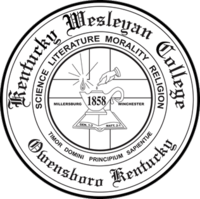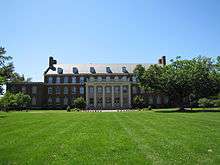Kentucky Wesleyan College
 | |
| Motto | Find Yourself |
|---|---|
| Type | Private Liberal Arts College |
| Established | 1858 |
Religious affiliation | United Methodist Church |
| Endowment | $29.6 million[1] |
| President | Barton D. Darrell[2] |
Academic staff | More than 88 percent of faculty have a Ph.D. or terminal degree |
| Students | 716 (Fall 2014) |
| Location | Owensboro, Kentucky, USA |
| Campus | Suburban; 55 acre (.22 km²) campus near the southern bypass |
| Colors | Purple and white |
| Athletics |
NCAA Division II G-MAC, Independent (football) |
| Sports | 17 varsity teams |
| Mascot | Panthers |
| Affiliations |
IAMSCU CIC |
| Website | www.kwc.edu |
 | |
Kentucky Wesleyan College (KWC) is a private Methodist college in Owensboro, a city on the Ohio River, in the U.S. state of Kentucky. KWC is east of Evansville, Indiana, north of Nashville, Tennessee, west of Louisville, Kentucky, and east of St. Louis, Missouri. Daviess County is home to 94,000 residents.
Kentucky Wesleyan College is known for its liberal arts programs. Fall 2014 enrollment was 716 students. http://www.kwc.edu
History

Kentucky Wesleyan College was founded in 1858 by the Kentucky Conference of the Methodist Episcopal Church. It was originally located in Millersburg. Classes began in 1866 and the first commencement took place in 1868. At first, it was a training school for preachers but soon business and liberal arts classes were added to the curriculum. In 1890 the school was moved to Winchester and soon after women began to be admitted for the first time. In 1951, the school moved to its present location in Kentucky's fourth largest city, Owensboro.[3]
Academics
Kentucky Wesleyan offers 30 majors and 12 pre-professional programs [4] and has a student-to-faculty ratio of 9:1.[5] Academics are divided into four divisions: Fine Arts & Humanities, Natural Sciences & Mathematics, Professional Studies, and Social Sciences.[6]
Kentucky Wesleyan College also offers a Bachelor of Science in Business Administration, a Bachelor of Science in Criminal Justice & Criminology, and a Bachelor of Science in General Studies completely Online.[7] Tuition for the online business degree is extremely competitive and affordable. Financial aid is available for all students who qualify.[8]
Student life
Kentucky Wesleyan offers over 40 student organizations on campus. These range from campus ministry, student government, Greek life, academic, and other special interest clubs.[9] Intramurals are offered on a seasonal basis.
Media and publications
- The Panogram — weekly student newspaper
- The Porphyrian — yearbook
- 90.3 WKWC — 5,000 watt FM radio station run by students and volunteers
Greek life
Kentucky Wesleyan has three national fraternities, two national sororities and one local sorority.[10]
Fraternities
Sororities
- Kappa Delta
- Alpha Omicron Pi
- Zeta Gamma Chi
Athletics
The Kentucky Wesleyan Panthers compete in NCAA Division II and was a charter member of the Great Lakes Valley Conference. KWC is currently a charter member of the Great Midwest Athletic Conference (GMAC) joining in the 2013-14 season. The 2014 KWC football team currently competes as an Independent NCAA Division II team after leaving the Great Lakes Valley Conference, as an associate member, after the 2013 season.
Intercollegiate men's teams include: baseball, basketball, cross country, golf, football, soccer, and implemented modern era indoor and outdoor track and field teams beginning in the 2012-2013 academic season. Women compete in basketball, cross country, golf, soccer, softball, tennis, volleyball, and also implemented modern era indoor and outdoor track and field teams in the 2012-2013 academic season.[11]
The men's basketball team advanced to the Division II championship game six consecutive years (1998–2003), winning in 1999 and 2001 under the direction of Ray Harper.[12] In addition to these successes, they won six other championships (1966, 1968, 1969, 1973, 1987, and 1990) and were runners-up in 1957. Overall, Kentucky Wesleyan has won eight NCAA Division II National Men's Basketball Championships, which is the most by any NCAA Division II School.[12]
Notable alumni
- Urban Valentine Williams Darlington - former bishop of the Methodist Episcopal Church, South
- G. Lindsey Davis - bishop of the United Methodist Church
- Ray Harper - Former head men's basketball coach, current head coach at Jacksonville State University
- Bobby R. Himes - history professor at Campbellsville University and Republican official
- John Wesley Hughes - founder of Asbury University and Kingswood College
- Doug Moseley - former Kentucky state senator and retired United Methodist minister
- Paul A. Porter - former Federal Communications Commission chairman
- Stanley Forman Reed - former justice of the United States Supreme Court
- Jody Richards - former Speaker of the House, Kentucky House of Representatives
- Roy Hunter Short - former Bishop of The Methodist Church and the United Methodist Church
- A. J. Smith - Executive Vice President and General Manager of the San Diego Chargers
- Benjamin T. Spencer
- Edward Lewis Tullis - former bishop of the Methodist Episcopal Church, South and the United Methodist Church
- Cory Wade - pitcher for the New York Yankees
- Russell Montfort - former minister at West End United Methodist Church in Nashville, Tennessee and former pastor (1977-1980) of the American Protestant Church in Bonn, Germany during the Cold War
- Mark Patton - CFO Colony Hardware
Presidents
College presidents include:[13]
|
1. Rev. Charles Taylor (1866–1870) |
17. David C. Hull (1925–1928) |
References
- ↑ http://www.nacubo.org/Documents/EndowmentFiles/2013NCSEEndowmentMarket%20ValuesRevisedFeb142014.pdf
- ↑ President Darrell
- ↑ History
- ↑ http://www.kwc.edu/page.php?page=1432. Retrieved 11 April 2014. Missing or empty
|title=(help) - ↑ "KWC Common Data Set 2013-2014" (PDF). Retrieved 11 April 2014.
- ↑ "KWC Academic Divisions". Retrieved 11 April 2014.
- ↑ "KWC Online". Retrieved 11 April 2014.
- ↑ "KWC Online Financial Aid". Retrieved 11 April 2014.
- ↑ "KWC Campus Clubs, Organizations, & Societies". Retrieved 11 April 2014.
- ↑ Greek life at KWC
- ↑ Athletic teams
- 1 2 Men's basketball NCAA Div. II Championships
- ↑ Presidents of the College
